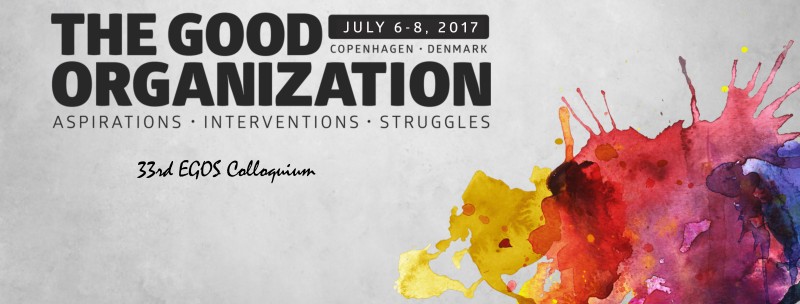Sub-theme 46: The Entanglement of Individual and Collective Identification
Call for Papers
The purpose of this sub-theme is to bring together identity scholars interested in exploring interrelated processes of
individual and collective identification. Identity construction in and around organizations has increasingly become central
to understanding processes of organizing (Brown & Toyoki, 2013) and social life more broadly (Jenkins, 2008). This is
reflected in a burgeoning body of identity literature within organization studies (Brown, 2015; Ybema et al., 2009). However,
the field is fragmented and contested in a range of ways and one essential aspect of this is the distinction between individual
and collective identity. Many studies tend to focus on one particular level of analysis, considering either individual (Watson,
2008), group (Patriotta & Spedale, 2011) or organizational (Hatch et al., 2015) identity as distinct phenomenon. This
has resulted in calls for more cross-level identity research focused on the ‘connecting collective’ (Ashforth et al., 2011)
and theorizing of the dynamics of interrelated individual-collective processes of identification (Humphreys & Brown, 2002)
as situated within and influenced by broader social and political processes (eg. Moufahim et al., 2015).
Building
on a sociological and anthropological tradition of scholars like Fredrik Barth, Erving Goffman and Richard Jenkins we argue
that individual and collective (group, community, organizational, national etc.) identity construction is inherently intertwined
and that although often reified, these ‘levels’ are mere analytical distinctions and thus a matter of analytical emphasis.
So far, identity literature has taken important steps toward increasing our understanding of for instance, the constructed,
relational and situational characteristics of identity processes (Coupland & Brown, 2012) and identity formation as key
aspect of organizing (Brown & Toyoki, 2013). Within these studies, socially constructed, discursive and narrative perspectives
on identity seem to dominate (Brown, 2015; Coupland & Brown, 2012). Research emphasizing the interrelation between for
instance individual and organizational identity similarly tends to employ a narrative approach (Humphreys & Brown, 2002).
Here, we call for papers that combine such approaches with those that emphasize the importance of interaction and performance
(Patriotta & Spedale, 2011). These latter approaches argue that identities are constructed and negotiated in interaction
(Jenkins, 2008) including through the ways in which individuals use their bodies and physical artefacts in various situations
or on different ‘stages’, as Goffman (1959) puts it.
In this sub-theme we aim to bring together scholars
interested in identity processes with the aim to further empirical work and theorizing on individual/collective identity as
inherently interrelated, specifically combining ‘narration’ and ‘interaction’ (Down & Reveley, 2009). We particularly
call for empirical papers in this direction, including ethnographic studies. We will also organize a panel with scholars such
as Andrew Brown, Christine Coupland, Sierk Ybema, Mona Moufahim, Simon Down, Mark Learmonth and/or Patrick Reedy.
Questions and themes that may be addressed in this sub-theme include, but are not limited to:
- How do people in organizations, both in discourse and interaction, negotiate and play with different sources of collective identification as part of their individual identity work while simultaneous working on those collective identities?
- What roles do artifacts and physical attributes play in ‘entangled identification’? And how do these differ across different types of settings, including for instance virtual social spaces?
- What is the role of technology in identification processes? For instance, how can concepts such as ‘technical identity’ (the combination of form and function of technological objects, Faulkner & Runde, 2013) enrich our understanding of individual-collective identification processes in organizations?
- How do categories emerge and change over time and across different situations through processes that are simultaneously individual and collective (for instance, ‘data scientists’, ‘digital nomads’, ‘business designers’, or ‘professional amateurs’) ?
- How can we combine discourse and interaction approaches in studying intertwined processes of individual and collective identification?
References
- Ashforth, B.E., Rogers, K.M., & Corley, K.G. (2011): “Identity in Organizations: Exploring Cross-level Dynamics.” Organization Science, 22 (5),1144–1156.
- Brown, A. (2015): “Identities and Identity Work in Organizations.” International Journal of Management Reviews, 17 (1), 20–40.
- Brown, A., & Toyoki, S. (2013). “Identity Work and Legitimacy.” Organization Studies, 34 (7), 875–896.
- Coupland, C., & Brown, A. (2012): “Identities in action: Processes and outcomes.” Scandinavian Journal of Management, 28 (1), 1–4.
- Down, S., & Reveley, J. (2009): “Between narration and interaction: Situating first-line supervisor identity work.” Human Relations, 62 (3), 379–401.
- Faulkner, P., & Runde, J. (2013): “Technological objects, social positions, and the transformational model of social activity.” MIS Quarterly, 37 (1), 803–818.
- Goffman, E. (1959): The Presentation of Self in Everyday Life. Garden City, NY: Doubleday.
- Hatch, M.J., Schultz, M., & Skov, A.M. (2015): “Organizational Identity and Culture in the Context of Managed Change: Transformation in the Carlsberg Group, 2009–2013.” Academy of Management Discoveries, 1 (1), 56–87.
- Humphreys, M., & Brown, A. (2002): “Narratives of Organizational Identity and Identification: A Case Study of Hegemony and Resistance.” Organization Studies, 23 (3), 421–447.
- Jenkins, R. (2008): Social Identity. Third edition. London: Routledge.
- Moufahim, M., Reedy, P., & Humphreys, M. (2015): “The Vlaams Belang: The Rhetoric of Organizational Identity.” Organization Studies, 36 (1), 91–111.
- Patriotta, G., & Spedale, S. (2011): “Micro-interaction dynamics in group decision making: Face games, interaction order and boundary work.” Scandinavian Journal of Management, 27 (4), 362–374.
- Watson, T. (2008): “Managing Identity: Identity Work, Personal Predicaments and Structural Circumstances.” Organization, 15 (1), 121–143.
- Ybema,
S., Keenoy, T., Oswick, C., Beverungen, A., Ellis, N., & Sabelis, I. (2009): “Articulating identities.” Human Relations,
62 (3), 299–322.


